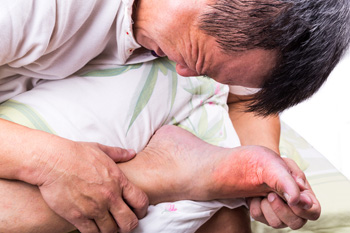
If your big toe is red, swollen, and radiating extreme pain, you may have developed a case of gout, which is a form of arthritis. Gout occurs when the body contains too much uric acid. This acid forms crystals that collect in the joints, commonly the first metatarsophalangeal (MTP) joint of the big toe. This results in inflammation that swells and reddens the skin around the joint. The pain usually starts in the morning and increases throughout the day. It can come on suddenly, and it can be quite severe. Gout also can cause stiffness in the MTP joint, which may make it difficult to walk. If gout is not treated immediately, it can become chronic and spread to other joints, such as the ankles, knees, fingers, and wrists. A podiatrist can prescribe medications and suggest lifestyle changes that can help to reduce the flare ups of gout. If you have been experiencing the symptoms of gout on a regular basis, it is wise to seek the help of a podiatrist immediately.
Gout is a painful condition that can be treated. If you are seeking treatment, contact one of our podiatrists from Lovely Foot Associates, PC. Our doctors will treat your foot and ankle needs.
What Is Gout?
Gout is a form of arthritis that is characterized by sudden, severe attacks of pain, redness, and tenderness in the joints. The condition usually affects the joint at the base of the big toe. A gout attack can occur at any random time, such as the middle of the night while you are asleep.
Symptoms
Risk Factors
Prior to visiting your podiatrist to receive treatment for gout, there are a few things you should do beforehand. If you have gout you should write down your symptoms--including when they started and how often you experience them, important medical information you may have, and any questions you may have. Writing down these three things will help your podiatrist in assessing your specific situation so that he or she may provide the best route of treatment for you.
If you have any questions, please feel free to contact our office located in Johnstown, PA . We offer the newest diagnostic and treatment technologies for all your foot care needs.